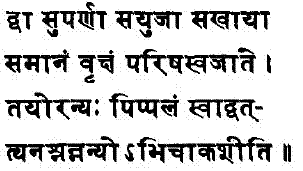No CrossRef data available.
Article contents
Art. II.—A Dialogue on the Vedantic Conception of Brahma
Published online by Cambridge University Press: 15 March 2011
Extract
European Scholar.—Is the Grod of the Vedántin a conscious or an unconscious being ?
Pandit.—Your question rendered into Sanskrit 
 would indeed startle a Vedántin, who would consider it an insult offered to his philosophy of pure spiritualism.
would indeed startle a Vedántin, who would consider it an insult offered to his philosophy of pure spiritualism.
- Type
- Original Communications
- Information
- Copyright
- Copyright © The Royal Asiatic Society 1877
References
page 33 note 1 The function of what is called by Hamilton the Elaborative Faculty or Understanding Proper.
page 34 note 1 See Mansel's Metaphysics, p. 364.Google Scholar
page 34 note 2 Mansel's Metaphysics, p. 70.Google Scholar
page 37 note 1 ![]()
page 37 note 2 ![]() S'wetáṡwatara Upanishad.
S'wetáṡwatara Upanishad.
page 37 note 3 Believed in by the Rámánujas.
page 38 note 1 
![]() S'ankara's Commentary on the Vedánta Sútras, vol. i. p. 454, Bib. Ind.Google Scholar
S'ankara's Commentary on the Vedánta Sútras, vol. i. p. 454, Bib. Ind.Google Scholar
“Name and Form—the seed of the phenomenal world, seeming to be one with God's omniscient self, but having their origin in the absence of true knowledge, thus inexplicable by identification (with God) or differentiation (from Him), are termed in the S'ruti and Smṛiti the Illusion, Power, or Nature of the universally conscious Lord. For the S'ruti says, ‘The void is what supports name and form. That which is distinct from these is Brahma,’ etc.”
“Name and form (Nature) cannot be declared identical with God, because they are unthinking, or material, Jaḍa: nor can they be declared separate from God, for what is kalpita, has its origin in false knowledge, or (to reconcile a prevalent phrase with the Vedantic tenet) created out of nothing, cannot have an independent reality or manifestation.”—Govinddnanda's Gloss.
page 39 note 1 ![]() “How could one know the knower! ”—Bṛihadáraṇyaka Upanishad.
“How could one know the knower! ”—Bṛihadáraṇyaka Upanishad.
page 39 note 2 The Pratyabhijña Darṡana, which bears a close affinity to the Vedánta. Both systems are at one in their main doctrines, but whilst the latter rests principally on revelation, the former rests on reason and an analysis of our consciousness.

“The knowledge of the absolute Intelligence is here taught by means of an examination into our (outward) sensations, such as that of the blue or the like, and (our inward consciousness) such as that of pleasure or the like, (both) most clearly manifest.”—Paṇḍit, vol. ii. p. 238.Google Scholar
page 41 note 1 Called also Vijñánátmá.
page 42 note 1  S'wetáṡwatara Upanishad, 4, 6.
S'wetáṡwatara Upanishad, 4, 6.
“Two birds, of fair plumage, ever associated and intimate, cling to the same tree (body): Of these, the one eats the tasteful fruit (pleasure and pain); untasting, shines forth the other.”
page 42 note 2 ![]() vishṇu Puráṇa.
vishṇu Puráṇa.
page 43 note 1 Mansel's Metaphysics, p. 359.Google Scholar
page 44 note 1 Metaphysics, p. 364.Google Scholar
page 45 note 1 Called also sákshin (witness), from being presented yet unaffected, ![]() Bhámati.
Bhámati.
page 46 note 1 The question itself is possible only under the conditions of duality, and so the answer too must be one that relates to a state of duality alone. For a man to consider whether he should act in this or that particular manner, it is necessary that he should perceive difference, and if he does perceive difference, he has no right to act in any other manner than that prescribed by the moral and religious laws ordained under the conditions of duality. If, however, through stupidity he argues himself into the commission of sin, in mistaken conformity with Vedantic non-duality, in spite of his actual consciousness of duality, purgatorial fires would be the inevitable consequence of such an act, and he would feel them neither more nor less really than he was conscious of the act itself. Thus all objections to the doctrine on the ground of morality are utterly untenable.
page 46 note 2 
“As before waking, all the perceptions and acts of a dream are felt as true, so before the recognition of the identity of the Divine and human soul, all perceptions and acts are properly regarded as true.”—S'ankara's Brahmasútra-bháshya, p. 449.Google Scholar
page 46 note 2 ![]()
(passage from the ṡruti, quoted by S'ankara, ibid. p. 240.)

Ashṭávakra-saṃhitá, 86, 1. See also Vedánta-sára, in the beginning.
page 46 note 2 
“Although the biting of a serpent, or bathing in water, or such like acts pertaining to the man in the state of dreaming are false, yet the fact of the consciousness itself, i.e. apart from the objects, is true, since it is not falsified even after waking. So as regards God, the only truth, there exists the subjective consciousness underlying the (phenomenally) false Veda (which teaches the absolute unity of God).” That is to say, the objectivity of the Veda along with that of every thing else is false, but the subjective consciousness that God is the only reality is true. This indeed might have been falsified, if consciousness itself had been denied, apart from its objective multiplicity. And this is far from being done, consciousness being held the only residuum of truth. As the objectivity of dreaming consciousness is falsified in the waking, but not its subjectivity; so the objectivity of waking consciousness itself is falsified in the Divine objectless Intelligence.
page 48 note 1 ![]()
S'ankara's Brahma-sútra-bháshya, p. 451.Google Scholar
page 47 note 1 
S'wetáṡwatara Upanishad.
“Him only shining, all this shines after; this universe shines through His light!”


